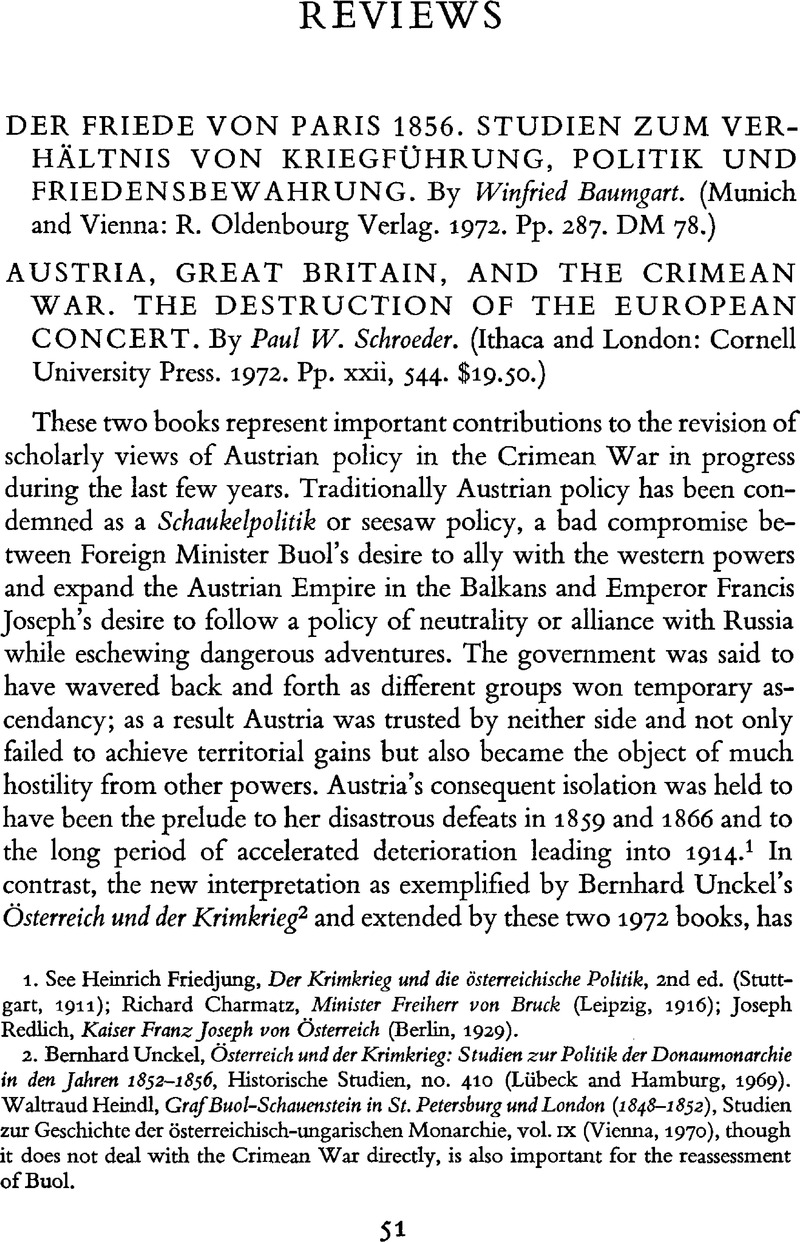No CrossRef data available.
Published online by Cambridge University Press: 16 December 2008

1. See Friedjung, Heinrich, Der Krimkrieg und die österreichische Politik, 2nd ed. (Stuttgart, 1911);Google ScholarCharmatz, Richard, Minister Freiherr von Bruck (Leipzig, 1916);Google ScholarRedlich, Joseph, Kaiser Franz Joseph von Österreich (Berlin, 1929).Google Scholar
2. Unckel, Bernhard, Österreich und der Krimkrieg: Studien zur Politik der Donaumonarchie in den Jahren 1852–1856, Historische Studien, no. 410 (Liibeck and Hamburg, 1969).Google ScholarHeindl, Waltraud, Graf Buol-Schauenstein in St. Petersburg und London (1848–1852), Studien zur Geschichte der Österreichisch-ungarischen Monarchie, vol. IX (Vienna, 1970), though it does not deal with the Crimean War directly, is also important for the reassessment of Buol.Google Scholar
3. Schroeder's research in private papers, incomprehensibly not summarized in his “Select Bibliography” which gives merely published works, included study of the papers of Aberdeen, Clarendon, Palmerston, and Buol.
4. Baumgart, Winfried, “Probleme der Krimkriegsforschung. Eine Studie über die Literatur des letzten Jahrzehnts (1961–1970),” Jahrbiicher für Geschichte Osteuropas, XIX (1971), 49–109, 243–64, 371–400.Google Scholar See also by the same author “Der Krimkrieg in der angelsächsischen und russischen militärgeschichtlichen Literatur der sechziger Jahre,” Militärgeschichtliche Mitteilungen, II (1970), 181–94.
5. Unckel, pp. 10–11.
6. Schroeder, Paul W., “Bruck vs. Buol: The Dispute over Austrian Eastern Policy, 1853–1855,” Journal of Modern History, XL (1968), 193–217.Google Scholar
7. Schroeder, Paul W., “Austria and the Danubian Principalities, 1853–1856,” Central European History, II (1969), 216–36.CrossRefGoogle Scholar
8. This criticism is stated most strongly in Schroeder, “Bruck vs. Buol,” pp. 213–17.
9. See Temperley, , England and the Near East: The Crimea (London, 1936);Google ScholarTemperley, , “Stratford de Redcliffe and the Origins of the Crimean War,” English Historical Review, XLVIII (1933), 601–21;CrossRefGoogle Scholar XLIX (1934), 265–98; Henderson, Gavin Burns, Crimean War Diplomacy (Glasgow, 1947);Google ScholarMalcolm-Smith, E. F., The Life of Stratford Canning (London, 1933).Google Scholar
10. Cornell, , Regina vs. Palmerston. The Correspondence between Queen Victoria and Her Foreign and Prime Minister 1837–1865 (London, 1962);Google ScholarRidley, , Lord Palmerston (New York, 1971)Google Scholar
11. Gash, , Politics in the Age of Peel (London, 1953);Google ScholarSouthgate, , The Passing of the Whigs 1832–1886 (London, 1962).Google Scholar
12. Southgate, , “The Most English Minister…” (New York, 1966);Google ScholarSproxton, , Palmerston and the Hungarian Revolution (Cambridge, 1919).Google Scholar
13. Bailey, F. E., British Policy and the Turkish Reform Movement 1826–1853 (Cambridge, Mass., 1942), pp. 188–90.Google Scholar
14. Temperley, H. W. V., “British Policy towards Parliamentary Rule and Constitutionalism in Turkey, 1830–1914,” Cambridge Historical Journal, IV (1933), 156–91.CrossRefGoogle Scholar
15. Schroeder here gives short shrift to the Puryear thesis (Vernon John Puryear, International Economics and Diplomacy in the Near East [Stanford, Calif, 1935]). Puryear's emphasis on Britain's commercial stake in the Ottoman Empire as a crucial factor predisposing her to support of the Turks is still widely, and deservedly, accepted.
16. Schroeder, Paul W., “World War I as Galloping Gertie: A Reply to Joachim Remak,” Journal of Modern History, XLIV (1972), 319–45.Google Scholar